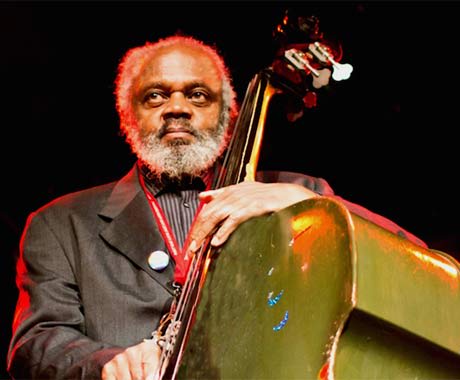Two bands played tonight. The first was Toronto's Aurochs, who started out with the promise of Paul Bley and Jimmy Giuffre but then morphed into rhythmic displacement and back again. It was at once disconcerting and inspired, as they wound their way through an uninterrupted set that spanned song and minimalism.
Henry Grimes got lost many years ago after playing with everyone from Cecil Taylor to Benny Goodman, until someone found him in poverty and seclusion and he reappeared like he never left. Someone gave him a bass, he married someone else who believed in him, and he came out playing almost like the time hadn't passed.
This night felt like him coming back. He stepped up on stage almost uncertain, fragile, and walked to the bass, which was on loan, and proceeded to lean into Thelonious Monk's Brilliant Corners. The sound was thick, almost leaden, like his hand was not used to the bow or the bass, buzzing and winding as though finding his way through a slow muddy stream.
Then he picked up the violin. He wasn't a technical player; Grimes exploded the violin into shards, fractures and buzzes with runs appearing and disappearing out of clouds of sound.
When it came down to it, it was like he was getting used to being there. The sequence of bass and violin clouds peeled back until, by the middle of the evening, he hit his stride: the clouds cleared and the articulation sparkled.
Interspersed throughout were recitations of poetry. These poems were mystical and philosophical visions of life and purpose. One got the feeling that this man was writing from a place of being alone and watching the world from way back when he was not playing. It evoked the mysticism that happens when life does not make sense, as it often doesn't when you stack beauty and art against crassness and cynicism. Sometimes when you go to a concert you hear music being presented as just that: music.
And other times you go and you witness a singular statement that is indivisible from a person's experience of life. The Henry Grimes solo concert was one of the latter. To call it good or bad or music or not would be missing the point.
Henry Grimes got lost many years ago after playing with everyone from Cecil Taylor to Benny Goodman, until someone found him in poverty and seclusion and he reappeared like he never left. Someone gave him a bass, he married someone else who believed in him, and he came out playing almost like the time hadn't passed.
This night felt like him coming back. He stepped up on stage almost uncertain, fragile, and walked to the bass, which was on loan, and proceeded to lean into Thelonious Monk's Brilliant Corners. The sound was thick, almost leaden, like his hand was not used to the bow or the bass, buzzing and winding as though finding his way through a slow muddy stream.
Then he picked up the violin. He wasn't a technical player; Grimes exploded the violin into shards, fractures and buzzes with runs appearing and disappearing out of clouds of sound.
When it came down to it, it was like he was getting used to being there. The sequence of bass and violin clouds peeled back until, by the middle of the evening, he hit his stride: the clouds cleared and the articulation sparkled.
Interspersed throughout were recitations of poetry. These poems were mystical and philosophical visions of life and purpose. One got the feeling that this man was writing from a place of being alone and watching the world from way back when he was not playing. It evoked the mysticism that happens when life does not make sense, as it often doesn't when you stack beauty and art against crassness and cynicism. Sometimes when you go to a concert you hear music being presented as just that: music.
And other times you go and you witness a singular statement that is indivisible from a person's experience of life. The Henry Grimes solo concert was one of the latter. To call it good or bad or music or not would be missing the point.
